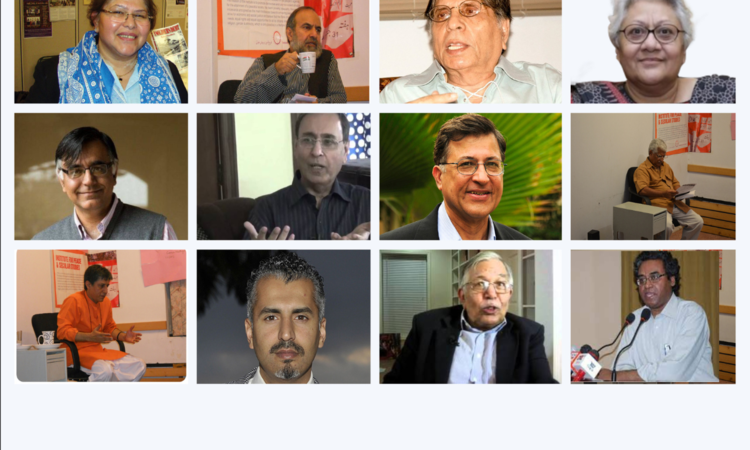TRACING THE ROOTS OF RELIGIOUS EXTREMISM: A SEMINAR SERIES
Seminar Series
The objective of this seminar series is to understand the roots and dynamics of religious extremism within the context of Pakistani society, which could be referenced to evolve a strategy for de-radicalization of youth. The following scholars have been invited to deliver talk in Urdu:
| No. | Speaker | Date |
| 1 | Dr. Tahir Kamran | March 5, 2011 |
| 2 | Khaled Ahmed | April 9, 2011 |
| 3 | Dr. Mubarak Ali | April 16, 2011 |
| 4 | Dr. Rubina Saigol | April 23, 2011 |
| 5 | Dr. Arifa Syeda Zohra | May 7, 2011 |
| 6 | Mr. Wajahat Masood | May 21, 2011 |
| 7 | Dr. Imdad Hussain | June 4, 2011 |
| 8 | Prof. Mohammad Waseem | June 11, 2011 |
| 9 | Mobarak Haider | June 18, 2011 |
| 10 | Col. (rtd) Nadir Ali | June 25, 2011 |
| 11 | Kazy Javed | July 2, 2011 |
| 12 | Dr. Saeed Shafqat | July 16, 2011 |
| 13 | Imtiaz Alam | July 23, 2011 |
| 14 | Ejaz Haider | July 30, 2011 |
| 15 | Hassan Jaffer Zaidi | September 10, 2011 |
| 16 | Dr. Khalid Zaheer | September 17, 2011 |
| 17 | Maajid Nawaz | September 23, 2011 |
| 18 | Amjad Ali Shakir | February 11, 2012 |
| 19 | Zafar Jamal | February 25, 2012 |
| 20 | Pervez Hoodbhoy | March 5, 2012 |
Background
Following the recent murder of a State Governor when various orthodox organizations forbade prayers; hundreds of lawyers registered to defend; thousands thronged the murderer’s house and ten of thousands publicly showed support, majority SMS among youth congratulated murder; and various guests in electronic media either openly or implicitly justified murder, signifies the depth of religious extremism in Pakistani society.
The current three tier far right hegemonic structure encapsulates culture, politics and physical threat. Peaceful missionary groups prepare the ground level by propagating fundamentalist religiosity. The largest organization holds a three day yearly congregation attended by more than a million people. Religio-political parties prepare the political cadre using either the vast Mosque-Madrassa network or through party organized student, teacher, labor unions & lobbies within state institutions. Although a relatively recent phenomena, the religio-militant organizations have a vast network, the largest having 1200 offices across the country run through funds generated by religious, sectarian or social services based donations.
One hears the usual analysis that a military dictator Zia ul Haq changed the culture of society by injecting an
‘Islamization’ doze within State institutions, the 1980s Afghan war led to both ideological radicalization & militarization, and monetary boon for the religious right which has continued since through active or indifferent attitude of the state and society. But the ideological roots of religious extremism have always existed and its spread into vast sections of society can not be limited to one ruler, institution, political party or the state. Thus there is a need to understand the historical, ideological, political, social and economic roots of religious extremism as recent events have called into question previously accepted notions:
- Religious extremism was limited to a particular social class with roots in the orthodoxy.
- The ‘moderate’ Barelvi sect, which was targeted by the Taliban through the bombings of shrines and killing of scholars can be a partner of moderate forces.
- A silent moderate majority exists?
The objective of this seminar series is to understand the roots and dynamics of religious extremism within the context of Pakistani society, which could be referenced to evolve a strategy for de-radicalization of youth. Scholars will be invited to deliver talks on the following topics in Urdu. The talks will involve a small audience with the key purpose to record and disseminate the lecture widely among the youth.
- Religious Extremism – An ideological framework
- Islamic Fundamentalist currents in Muslim history
- History of orthodoxy in India
- Religious Right and the creation of Pakistan
- The Objectives Resolution & the Early years of Pakistan
- Imperialism and the Religious Right
- The Mullah Military Alliance?
- Zia’s Islamization of the State
- Religious Extremism in the State’s Education Curriculum
- Jamiat and Public Education Institutions
- 80s and the rise of Jihad
- Dissecting the Religious Right:Tableegh, Sharia and Jihad
Media Coverage

